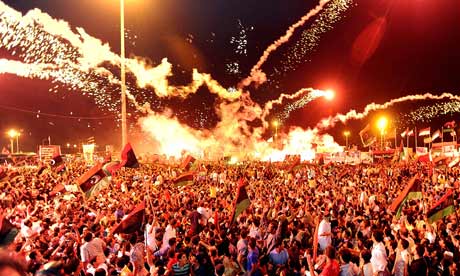From Egypt’s Tahrir Square to Libya and Syria, the fate of the region still hangs in the balance
Article history

This has been a momentous year for the Arab world. But as spring and summer gave way to a bloody and inconclusive winter, the fate of the region’s uprisings remained uncertain. Unpredictable, extraordinary events affecting millions have become the norm.
Egypt, the largest and most important Arab country, is only at the start of a long road to change. The generals who persuaded Hosni Mubarak to step down in the face of spontaneous, peaceful protests after 30 years in power are still in charge. But they are starting to grasp that transition to democracy will not easily accommodate their dominance. Elections finally got under way after another spasm of violence in Cairo’s Tahrir Square.
Things look far better in Tunisia, where the Jasmine revolution was triggered by the suicide of a young man whose despair seemed emblematic of an entire generation. Its first election since the departure of Zein al-Abidine Bin Ali went smoothly. But Tunisia’s success, built on developed institutions, an educated population, relatively advanced women’s rights and proximity to Europe, looks to be the exception, not the norm.
Libya‘s February revolution was a different kind of exception for the whole region. Muammar Gaddafi‘s eccentricities and isolation meant that the suppression of protests in Benghazi galvanised Arab as well as western opinion against him. Nato’s intervention, crucially supported by Qatar and the United Arab Emirates, helped a united opposition bring down a hated regime. Gaddafi’s death in Sirte represented closure – a brutal end to his brutal 42-year rule.
Impoverished Yemen is another special case. Its uprising combined mass protests with the conflicts of elites, regions and tribes. Ali Abdullah Saleh, its autocratic president, finally agreed to go, securing a deal that will spare him Mubarak’s humiliation in court if not Ben Ali’s Saudi exile. Saleh’s exit after 33 years is a big change but not a revolutionary break – as his family and the old ruling party jockey for power with newcomers.
The interests of Saudi Arabia and a US worried by a residual al-Qaida threat did much to determine that outcome. It was a similar story inBahrain, the island state that straddles the region’s sectarian divide, its Sunni Muslim dynasty ruling over a restive Shia majority, although politics are guided as much by the presence of the US Fifth Fleet and Iran across the Gulf as by any domestic struggle. Bahrain’s Pearl revolution has been crushed or contained but its root causes have not yet been addressed.
Containment has been the watchword. The Saudi kingdom spent lavishly on social welfare and job creation to defuse domestic dissent, and blamed Iran for stirring Shia unrest. Jordan and Morocco, poorest of the western-backed monarchies, went further, initiating limited reform to preserve the status quo while accommodating demands for democracy.
The big question mark hung over Syria, where at least 4,000 people have been killed in an uprising that began peacefully but now involves armed attacks. Syria has seen no defections of senior loyalists, nor is there any prospect of outside military intervention. The regime appears resilient, sectarianism is a real danger and the opposition is bitterly divided. Still, the Arab League and Turkey have turned against Bashar al-Assad, though he can count on being defended at the UN by Russia and China. Economic sanctions are starting to hurt.
The variety in what is happening was encapsulated in November in a split-screen image broadcast on al-Jazeera TV, both a dedicated reporter of and unabashed cheerleader for the Arab uprisings: one side showed the opening of Tunisia’s constituent assembly, dominated by once-banned parties; the other recorded clouds of teargas in Cairo as Egypt’s military fought back against demands for civilian rule. And there are other juxtapositions: jerky video clips filmed on mobile phones showing brave Syrians demanding freedom with the crackle of gunfire audible, and the mass rallies of flag-waving Assad supporters in central Damascus. Bahrain’s government mounted a slick PR campaign to advertise reform while Shia protesters clash nightly with the riot police. The dominant narrative of the Arab spring was written defiantly in the streets but the regimes’ fightback continues.
Common themes stand out. Security “solutions” do not work – or not unless followed by political concessions. Activists across the Arab world speak of breaking through the barrier of fear so that even the harshest repression no longer deters. The experience of one revolution has inspired another in sympathy and solidarity: Tunisia, Egypt; Egypt, Bahrain; Libya, Syria. Everywhere the rhetoric of change is of parliamentary democracy as the ideal. Angry subjects aspire to become citizens who demand human rights, an end to corruption and the establishment of the rule of law. “Our weapons are our dreams,” went an intoxicating Tahrir Square slogan. And everywhere the role of Islamists is a hot topic. Suppressed for decades, Egypt’s Muslim Brotherhood was the biggest winner in the first round of parliamentary elections. But having survived in an authoritarian environment, it will now have to campaign in a pluralistic one.
Freedom may encourage moderation and pragmatism. But the worrying strength of conservative Salafists, more extreme fundamentalists, will have its effect too. In Tunisia the An-Nahda party has undergone a remarkable transformation, seeing its candidate, a former political prisoner, become prime minister. Morocco’s elections made gains for the like-minded Justice and Development party. Islamists look like playing a big role in Libya. All insist that they are not seeking to exercise sole power.







